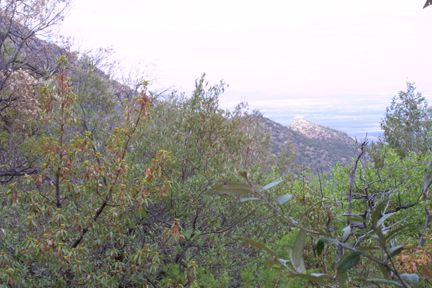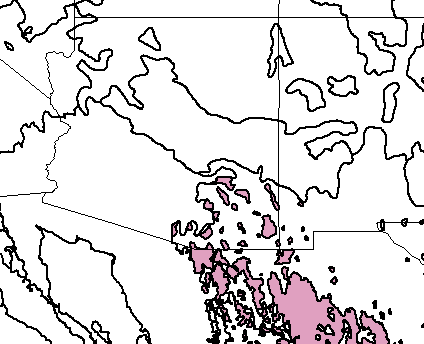
Madera Canyon, southeastern Arizona
Bioimages home (click on an image to enlarge)
view
this page in its intended navigation context
Madrean Sky Islands Montane Forests
(Sierra Madre Occidental Pine-Oak Forests) (WWF
ecoregion
NA0302)

Madera Canyon, southeastern Arizona

Source of bioregions data:
Olson, D. M. and
E. Dinerstein. The Global 200: Priority ecoregions for global conservation. (PDF
file) Annals of the Missouri Botanical Garden 89:125-126.
Distinctiveness (1=highest,4=lowest): 1
(globally outstanding)
In the United States, this ecoregion is an archipelago of mountaintops
surrounded by xeric grass and shrublands. The dynamic history and
isolation of the forested peaks has produced unusual evolutionary phenomena.
Mixing of suptropical and temperate organisms has also created unusual
ecological assemblages. The Madrean Sky Islands in the U.S. are a northern
extension of the Mexican Sierra Madre Occidental mountain system.*
Conservation Status (1=most endangered, 5=most
intact): 4 (relatively stable in U.S.)
Overgrazing, recreational pressure, military use, and development are threats.
In Mexico, much of the forests have been cleared through logging and
agriculture.*
 Pinus leiophylla var. chihuahuana (Chihuahuan pine)
Pinus leiophylla var. chihuahuana (Chihuahuan pine) Pinus cembroides (Mexican pinyon)
Pinus cembroides (Mexican pinyon) Pinus arizonica var. arizonica (Arizona pine)
Pinus arizonica var. arizonica (Arizona pine) Quercus hypoleucoides
(silverleaf oak)
Quercus hypoleucoides
(silverleaf oak) Juniperus deppeana
(alligator juniper)
Juniperus deppeana
(alligator juniper) Arctostaphylos pungens (pointleaf manzanita) (c) 2004
Maurice J. Kaufmann
Arctostaphylos pungens (pointleaf manzanita) (c) 2004
Maurice J. Kaufmann
Some views from the ecoregion
Madera Canyon, southeastern Arizona

Transition to shrubland on lower slopes
hires

Oak-pine woodland vegetation
hires

Pinus engelmannii (Apache pine)
hires

Platanus wrightii (Arizona sycamore) hires

Arbutus arizonica
(Arizona madrone) hires
* Ricketts, T.H., E. Dinerstein, D.M. Olson, C.J. Loucks, et al. (1999) Terrestrial Ecoregions of North America: A Conservation Assessment. World Wildlife Fund - United States and Canada. Island Press, Washington, D.C. pp. 258-260.
Except as noted, images copyright 2002-2004 Steve Baskauf - Terms of use